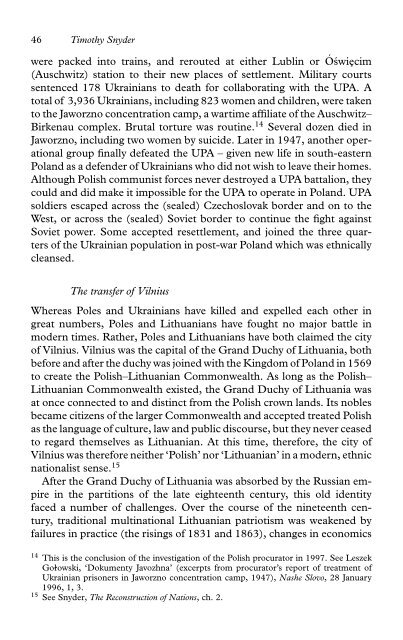Memory and Power in Post-War Europe: Studies in the Presence of ...
Memory and Power in Post-War Europe: Studies in the Presence of ...
Memory and Power in Post-War Europe: Studies in the Presence of ...
You also want an ePaper? Increase the reach of your titles
YUMPU automatically turns print PDFs into web optimized ePapers that Google loves.
46 Timothy Snyder<br />
were packed <strong>in</strong>to tra<strong>in</strong>s, <strong>and</strong> rerouted at ei<strong>the</strong>r Lubl<strong>in</strong> or Ó´swi¸ecim<br />
(Auschwitz) station to <strong>the</strong>ir new places <strong>of</strong> settlement. Military courts<br />
sentenced 178 Ukra<strong>in</strong>ians to death for collaborat<strong>in</strong>g with <strong>the</strong> UPA. A<br />
total <strong>of</strong> 3,936 Ukra<strong>in</strong>ians, <strong>in</strong>clud<strong>in</strong>g 823 women <strong>and</strong> children, were taken<br />
to <strong>the</strong> Jaworzno concentration camp, a wartime affiliate <strong>of</strong> <strong>the</strong> Auschwitz–<br />
Birkenau complex. Brutal torture was rout<strong>in</strong>e. 14 Several dozen died <strong>in</strong><br />
Jaworzno, <strong>in</strong>clud<strong>in</strong>g two women by suicide. Later <strong>in</strong> 1947, ano<strong>the</strong>r operational<br />
group f<strong>in</strong>ally defeated <strong>the</strong> UPA – given new life <strong>in</strong> south-eastern<br />
Pol<strong>and</strong> as a defender <strong>of</strong> Ukra<strong>in</strong>ians who did not wish to leave <strong>the</strong>ir homes.<br />
Although Polish communist forces never destroyed a UPA battalion, <strong>the</strong>y<br />
could <strong>and</strong> did make it impossible for <strong>the</strong> UPA to operate <strong>in</strong> Pol<strong>and</strong>. UPA<br />
soldiers escaped across <strong>the</strong> (sealed) Czechoslovak border <strong>and</strong> on to <strong>the</strong><br />
West, or across <strong>the</strong> (sealed) Soviet border to cont<strong>in</strong>ue <strong>the</strong> fight aga<strong>in</strong>st<br />
Soviet power. Some accepted resettlement, <strong>and</strong> jo<strong>in</strong>ed <strong>the</strong> three quarters<br />
<strong>of</strong> <strong>the</strong> Ukra<strong>in</strong>ian population <strong>in</strong> post-war Pol<strong>and</strong> which was ethnically<br />
cleansed.<br />
The transfer <strong>of</strong> Vilnius<br />
Whereas Poles <strong>and</strong> Ukra<strong>in</strong>ians have killed <strong>and</strong> expelled each o<strong>the</strong>r <strong>in</strong><br />
great numbers, Poles <strong>and</strong> Lithuanians have fought no major battle <strong>in</strong><br />
modern times. Ra<strong>the</strong>r, Poles <strong>and</strong> Lithuanians have both claimed <strong>the</strong> city<br />
<strong>of</strong> Vilnius. Vilnius was <strong>the</strong> capital <strong>of</strong> <strong>the</strong> Gr<strong>and</strong> Duchy <strong>of</strong> Lithuania, both<br />
before <strong>and</strong> after <strong>the</strong> duchy was jo<strong>in</strong>ed with <strong>the</strong> K<strong>in</strong>gdom <strong>of</strong> Pol<strong>and</strong> <strong>in</strong> 1569<br />
to create <strong>the</strong> Polish–Lithuanian Commonwealth. As long as <strong>the</strong> Polish–<br />
Lithuanian Commonwealth existed, <strong>the</strong> Gr<strong>and</strong> Duchy <strong>of</strong> Lithuania was<br />
at once connected to <strong>and</strong> dist<strong>in</strong>ct from <strong>the</strong> Polish crown l<strong>and</strong>s. Its nobles<br />
became citizens <strong>of</strong> <strong>the</strong> larger Commonwealth <strong>and</strong> accepted treated Polish<br />
as <strong>the</strong> language <strong>of</strong> culture, law <strong>and</strong> public discourse, but <strong>the</strong>y never ceased<br />
to regard <strong>the</strong>mselves as Lithuanian. At this time, <strong>the</strong>refore, <strong>the</strong> city <strong>of</strong><br />
Vilnius was <strong>the</strong>refore nei<strong>the</strong>r ‘Polish’ nor ‘Lithuanian’ <strong>in</strong> a modern, ethnic<br />
nationalist sense. 15<br />
After <strong>the</strong> Gr<strong>and</strong> Duchy <strong>of</strong> Lithuania was absorbed by <strong>the</strong> Russian empire<br />
<strong>in</strong> <strong>the</strong> partitions <strong>of</strong> <strong>the</strong> late eighteenth century, this old identity<br />
faced a number <strong>of</strong> challenges. Over <strong>the</strong> course <strong>of</strong> <strong>the</strong> n<strong>in</strong>eteenth century,<br />
traditional mult<strong>in</strong>ational Lithuanian patriotism was weakened by<br />
failures <strong>in</strong> practice (<strong>the</strong> ris<strong>in</strong>gs <strong>of</strong> 1831 <strong>and</strong> 1863), changes <strong>in</strong> economics<br />
14 This is <strong>the</strong> conclusion <strong>of</strong> <strong>the</strong> <strong>in</strong>vestigation <strong>of</strong> <strong>the</strong> Polish procurator <strong>in</strong> 1997. See Leszek<br />
Gólowski, ‘Dokumenty Javozhna’ (excerpts from procurator’s report <strong>of</strong> treatment <strong>of</strong><br />
Ukra<strong>in</strong>ian prisoners <strong>in</strong> Jaworzno concentration camp, 1947), Nashe Slovo, 28 January<br />
1996, 1, 3.<br />
15 See Snyder, The Reconstruction <strong>of</strong> Nations, ch. 2.
















